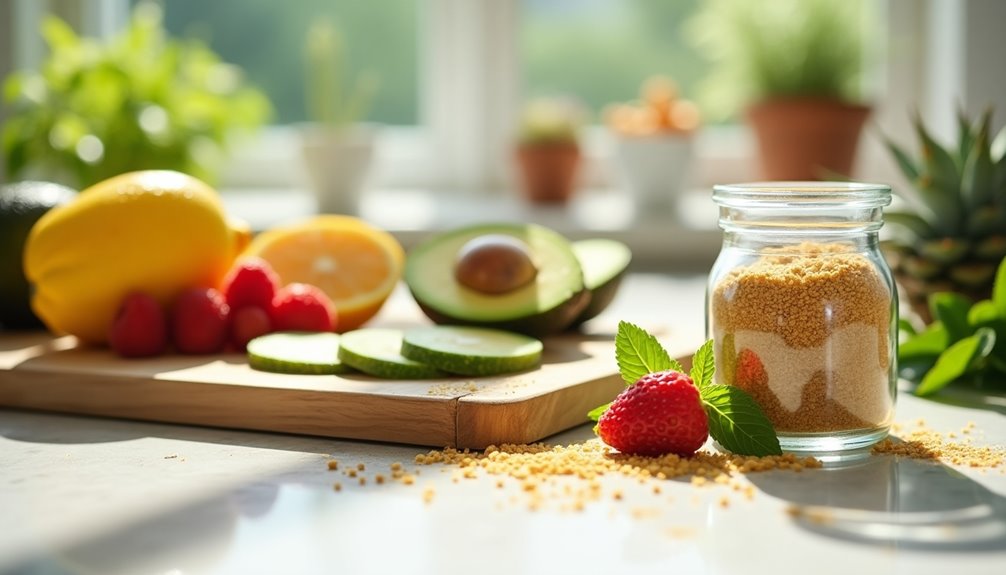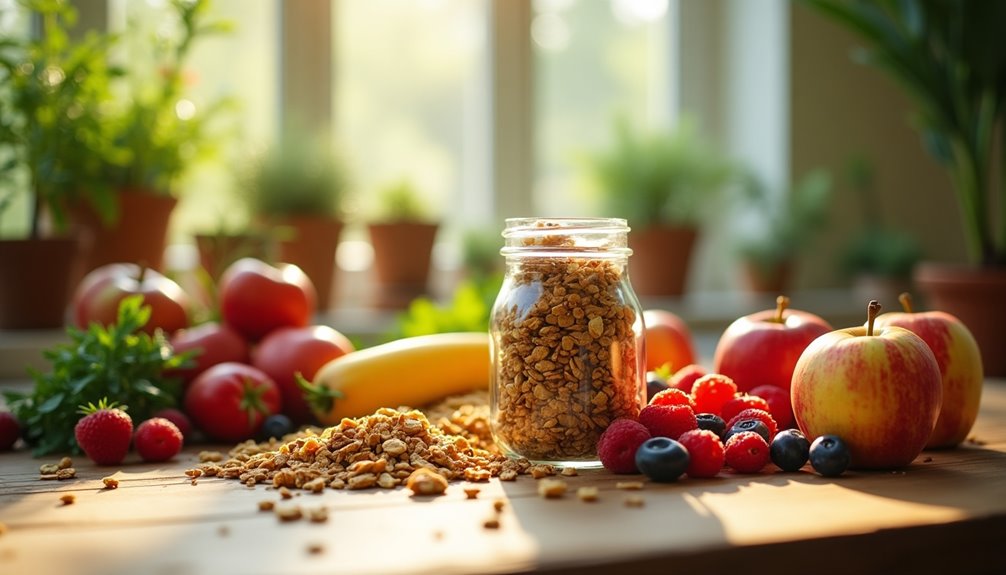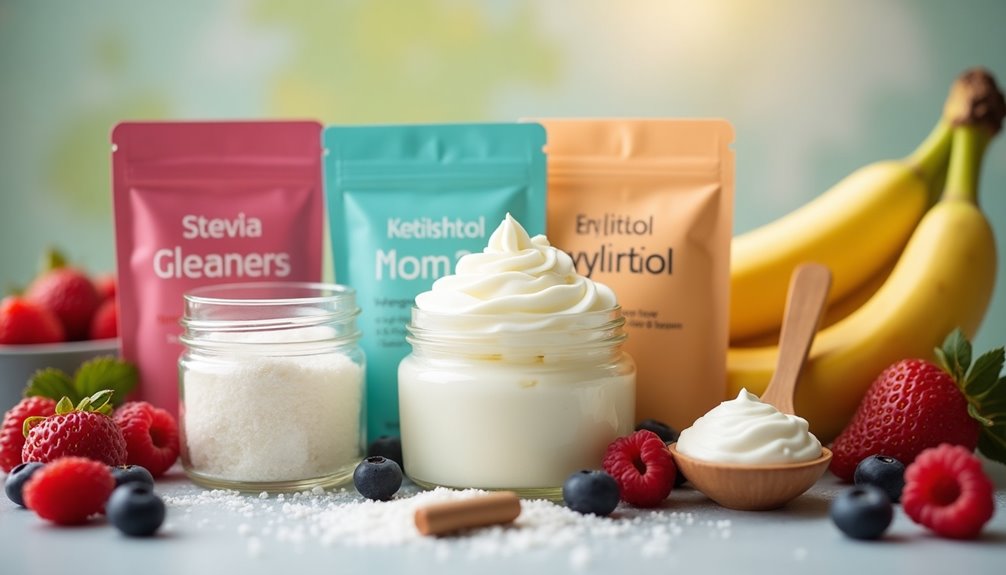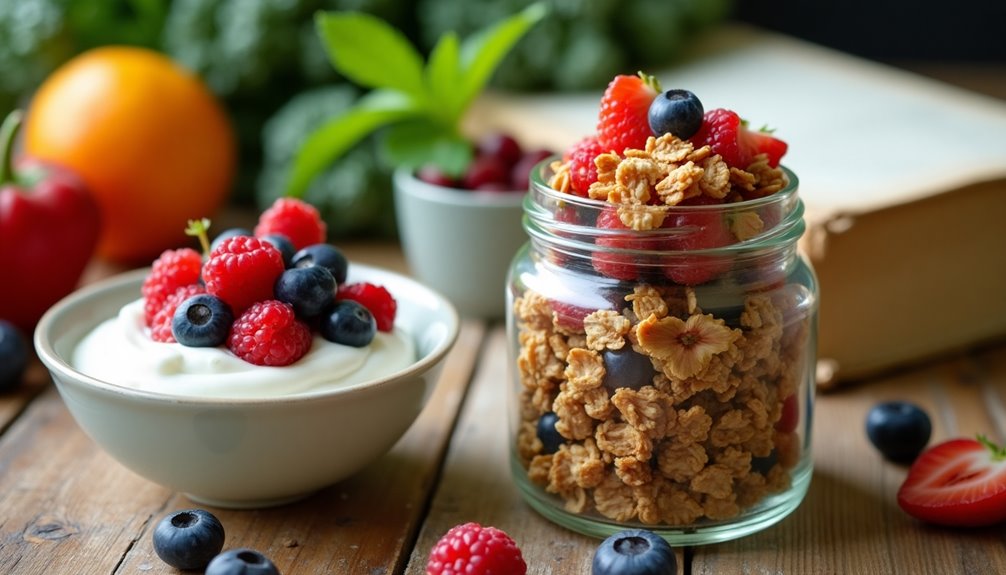Adopting a sugar-free diet can greatly improve your health and well-being. You'll probably notice enhanced energy levels and more stable blood sugar, which can aid in weight management. By eliminating hidden sugars present in numerous processed foods, you may also enjoy clearer skin and decreased cravings. Concentrate on whole foods such as vegetables, lean proteins, and healthy fats while delving into options like stevia and monk fruit. It is crucial to pinpoint triggers for your cravings and discover healthier substitutions. If you're interested in useful tips for sustaining this lifestyle, there's more informative information ahead.
Key Takeaways
- A sugar-free diet reduces cravings and promotes healthier food choices, leading to weight management and improved overall health.
- Focus on whole foods like vegetables, lean proteins, and healthy fats while avoiding hidden sugars in processed products.
- Natural sweeteners like stevia and monk fruit can satisfy sweet cravings without the negative effects of sugar.
- Transitioning involves tracking sugar cravings, replacing sugary snacks, and gradually incorporating healthier alternatives into your diet.
- Benefits include improved energy levels, clearer skin, and enhanced mood and cognitive function without sugar spikes.
Understanding Sugar and Its Effects

While sugar is often seen as a simple source of energy, its effects on your body can be complex and far-reaching. You might enjoy the quick boost it provides, but that same sugar can lead to significant health issues. One concern is sugar addiction. Many people find themselves craving sugary foods more than they realize, leading to a cycle of overeating that can be hard to break. This isn't just about willpower; research shows that sugar can trigger the brain's reward system, similar to addictive substances.
Hidden sugars are another aspect worth considering. They lurk in many processed foods, even those marketed as healthy. You might think you're making a good choice with a "low-fat" yogurt or a "natural" granola bar, only to discover they're loaded with added sugars. These hidden sugars can contribute to weight gain, increased cravings, and even metabolic disorders over time.
It's essential to stay informed and aware of the sugar content in your diet. Reading labels can help you make better choices and understand what you're truly consuming. By recognizing the signs of sugar addiction and being cautious of hidden sugars, you can take control of your health. Connecting with others on this journey can also foster a supportive community, making it easier to share tips and celebrate progress. The more you know, the better equipped you're to make healthier choices that align with your goals. Additionally, understanding the impact of calorie myths can further enhance your dietary decisions and improve your overall health.
Benefits of a Sugar-Free Diet

Cutting sugar from your diet can lead to a variety of health benefits that enhance your overall well-being. One of the most noticeable changes you might experience is improved energy levels. When you eliminate sugar, you stabilize your blood sugar, which helps prevent the crashes that often follow sugary snacks. This means you'll feel more energetic throughout your day, allowing you to engage more fully in activities you love.
Another significant benefit is weight management. Reducing sugar intake can help you control your calorie consumption and promote fat loss. Without the added sugars, you'll find it easier to make healthier food choices, contributing to a leaner physique over time.
You may also notice clearer skin. High sugar consumption has been linked to acne and other skin issues. By cutting sugar, you might reduce inflammation and breakouts, resulting in a complexion that feels fresh and revitalized.
Finally, one of the most rewarding aspects of a sugar-free diet is the reduction of cravings. As your body adjusts to less sugar, you'll likely find that your cravings for sweets diminish. This can empower you to make more conscious food choices, fostering a healthier relationship with food. Additionally, adopting a sugar-free lifestyle can complement a custom keto diet plan, which further enhances your weight management efforts.
Embracing a sugar-free lifestyle not only supports your physical health but also cultivates a sense of community with others who share similar goals. By prioritizing these benefits, you're taking a meaningful step toward a healthier, happier you.
Common Misconceptions About Sugar-Free

Many individuals have misunderstandings regarding what it entails to embrace a sugar-free eating plan. One prevalent misconception is that adopting a sugar-free lifestyle implies forfeiting the opportunity to relish sweet flavors in the future. In truth, numerous fruits and natural sweeteners can gratify your sweet cravings without the additional sugars that often trigger sugar desires.
Another fallacy is assuming all sugar alternatives are detrimental. While certain synthetic sweeteners may have adverse impacts, others, such as stevia and monk fruit, are deemed safe and can aid you in transitioning away from sugar. It's crucial to conduct research and select substitutes that align with your health objectives.
You may also believe that any item labeled as "sugar-free" is automatically deemed healthy. Nonetheless, exercise caution regarding hidden sugars frequently present in processed foods. Components like high-fructose corn syrup or cane syrup can still contribute to your total sugar consumption. Diligently scrutinizing labels is vital to evade these covert additions.
Furthermore, some individuals think that completely eliminating sugar will eradicate cravings. Although it can assist in diminishing cravings gradually, experiencing them during the adjustment period is normal. Maintaining hydration, consuming well-rounded meals, and integrating whole foods can significantly aid in managing these impulses. Additionally, being mindful of the health dangers of traditional bread can help you make better choices in your sugar-free journey.
In essence, comprehending these misconceptions can empower you on your voyage towards a sugar-free existence. It's about making educated decisions that suit your specific requirements, enabling you to revel in a sense of inclusion in a community dedicated to enhancing health.
Foods to Avoid on a Sugar-Free Diet

Mastering a sugar-free diet requires a keen awareness of the foods that can sabotage your efforts. Many people think they're avoiding sugar, but hidden sugars lurk in unexpected places. Processed foods, sauces, and even some whole foods can contain added sugars that contribute to your daily intake.
For instance, ketchup, salad dressings, and yogurt often have hidden sugars that can derail your commitment.
It's essential to read labels diligently. Look for ingredients like high fructose corn syrup, cane sugar, or even natural sweeteners like honey and agave, which can still spike your sugar cravings. You'll be surprised at how many "healthy" snacks contain these sneaky additions.
Granola bars, flavored nuts, and dried fruits can also pack a sugary punch.
Don't forget to steer clear of sugary beverages. Sodas, sweetened teas, and even some fruit juices can contain high levels of sugar, making it harder to stick to your goals. When you're craving a sweet treat, it's easy to reach for these items out of habit, but they can keep you locked in a cycle of sugar cravings.
Instead, focus on whole foods like vegetables, lean proteins, and healthy fats. These won't only help satisfy your hunger but also keep your cravings at bay. Additionally, drinking water from SlimCrystal bottles can enhance your overall health and vitality as you navigate your sugar-free journey. Remember, being aware of what you eat is key to staying true to your sugar-free journey and building a healthier lifestyle.
Sugar Alternatives and Substitutes

When it comes to sweetening your meals without sugar, several alternatives can help you satisfy your cravings without the added calories or blood sugar spikes. You've likely heard of various sweetener options, each with unique characteristics.
Natural sweeteners like stevia and monk fruit extract are popular choices. They provide sweetness without affecting your blood sugar levels, making them ideal for those managing diabetes or weight.
Another category worth exploring is sugar alcohols, such as erythritol and xylitol. These sweeteners come from plant sources and offer fewer calories than sugar. They're often used in low-calorie and sugar-free products. However, it's important to use them in moderation, as consuming large amounts can lead to digestive discomfort for some individuals.
Aspartame and sucralose, artificial sweeteners, are also available. They're much sweeter than sugar, so you'll need much less to achieve the desired taste. While they're generally considered safe, some people prefer to stick with natural options due to considerations about long-term health effects.
When choosing a sweetener, it's vital to take into account your personal preferences and dietary needs. Experiment with different sweetener options to find what works best for you. Remember that reducing sugar intake doesn't mean sacrificing flavor; with the right alternatives, you can enjoy your meals while maintaining a healthy lifestyle. Embrace the journey of discovering new flavors and enjoy the benefits of a sugar-free diet! Additionally, incorporating whole food sources of protein can enhance your energy levels and help in maintaining a balanced diet.
Tips for Transitioning to Sugar-Free

Shifting to a sugar-free lifestyle can feel overwhelming at first, but taking it step by step makes the process manageable. Start by identifying your sugar cravings. Keep a journal for a week to track when you feel the urge for sweets. This awareness helps you understand your triggers and prepares you for healthy swaps.
Next, gradually replace sugary snacks with healthier options. For instance, if you're tempted by candy, try fresh fruit or nuts instead. Not only are these alternatives lower in sugar, but they also provide essential nutrients and fiber. You'll feel fuller and more satisfied without the sugar spike and crash.
Another effective strategy is to experiment with natural sweeteners like stevia or monk fruit. Using these in moderation can help satisfy your sweet tooth without the added sugar. Remember, it's okay to miss sugar at first, so be kind to yourself during this adjustment.
Don't forget to read food labels. Many processed foods contain hidden sugars, so becoming familiar with what to look for helps you make informed choices. Consider preparing meals at home, as this gives you control over ingredients and allows you to create delicious, sugar-free dishes. Additionally, incorporating more plant-based foods into your diet can enhance your overall health and provide a variety of flavors without added sugars.
Lastly, connect with others on this journey. Sharing experiences can provide support and motivation. Whether it's joining a local group or engaging in online forums, building a community will help you feel less alone. Embrace the journey, and remember that every small step counts toward a healthier, sugar-free life.
Meal Planning for Sugar-Free Living

Planning your meals is a powerful way to support your sugar-free lifestyle and guarantee you stay on track. By dedicating time to meal planning, you'll reduce the temptation to reach for sugary options when hunger strikes. Start by outlining your week's meals and snacks, ensuring they're balanced and satisfying.
When grocery shopping, stick to the perimeter of the store where whole foods like fruits, vegetables, lean proteins, and whole grains are typically found. This helps you avoid processed foods that often contain hidden sugars. Make a shopping list based on your meal plan to stay focused and prevent impulse buys.
For recipe ideas, consider creating dishes that emphasize natural flavors. For breakfast, try oatmeal topped with fresh berries and nuts. For lunch, a hearty salad with grilled chicken, avocado, and a homemade vinaigrette can be both filling and nutritious. Dinner could feature stir-fried vegetables with brown rice and tofu or a hearty vegetable soup.
Don't forget about snacks! Keep options like almonds, Greek yogurt, or veggie sticks on hand. These choices will help satisfy your cravings while keeping sugar at bay. Additionally, incorporating fat-melting smoothie recipes into your meal plan can provide a nutritious and satisfying alternative to sugary snacks.
Impact on Mental Health

Adopting a sugar-free diet can greatly influence your mental health, often leading to improved mood and cognitive function. Research shows that high sugar intake can contribute to mood swings and increased anxiety. When you eliminate sugar, you might notice a more stable emotional state, which can enhance your overall emotional well-being.
Cutting out sugar can also positively impact your cognitive function. Sugary foods can lead to spikes and crashes in energy levels, which can affect your ability to focus and think clearly. By switching to a sugar-free diet, you may experience steadier energy levels throughout the day, allowing you to concentrate better on tasks and engage more meaningfully with others.
Moreover, reducing sugar can help you develop healthier eating habits, which are essential for long-term mental health. Whole foods, rich in nutrients, provide the brain with the necessary fuel it needs to function optimally. Your brain thrives on a balanced diet, and when you prioritize nutrient-dense foods, you're likely to see improvements in memory, learning, and overall cognitive performance. Research indicates that a balanced diet can significantly influence the management of diabetes, which further supports the connection between nutrition and mental health.
In a society that often connects food with social experiences, choosing a sugar-free lifestyle can also foster a sense of belonging. You'll find communities and support networks that share your commitment to health. Together, you can celebrate progress and motivate each other, creating an enriching environment that promotes both emotional well-being and cognitive health. Making this change can be a powerful step toward a happier, healthier you.
Long-Term Sustainability of Sugar-Free Diet

Maintaining a sugar-free diet for the long term can be a rewarding yet demanding journey. You'll need to focus on achieving nutritional balance while maneuvering through various social situations. This balance is essential to guarantee you're receiving all the necessary nutrients your body needs.
Here's a quick overview of some potential challenges and strategies to help you remain dedicated:
| Challenge | Strategy |
|---|---|
| Cravings for sweet foods | Find healthier alternatives like fruits or sugar substitutes. |
| Social gatherings | Communicate your dietary choices and bring your own snacks. |
| Limited dining options | Research menus in advance and suggest restaurants with healthy options. |
| Emotional eating | Identify triggers and develop coping mechanisms, like exercise or meditation. |
| Perceived restrictions | Focus on the positive aspects of your diet, like better energy levels and improved health. |
By employing these strategies, you can cultivate a supportive environment for your sugar-free lifestyle. Surrounding yourself with friends and family who respect your choices makes a significant difference. You'll find that many people are understanding and may even join you in your journey. Additionally, integrating a sugar-free diet can help manage underlying conditions that may otherwise complicate your health.
Lastly, remember that occasional slip-ups are normal. Instead of feeling guilty, view them as learning experiences that can help you strengthen your dedication to a sugar-free lifestyle. With the right mindset and support network, you can maintain your sugar-free diet sustainably and enjoy the benefits it brings.
Frequently Asked Questions
Can I Eat Fruit on a Sugar-Free Diet?
You might wonder if you can eat fruit while avoiding sugar. While fruits do contain natural sugars, they're also packed with essential nutrients. Instead of cutting out all fruit, consider moderation.
You can also try fruit substitutes like berries, which are lower in sugar. If you're craving something sweet, look for sugar-free desserts that incorporate these options.
Balancing your intake can help you enjoy the benefits of fruit without overwhelming your diet.
How Does a Sugar-Free Diet Affect Athletic Performance?
Studies show that about 60% of athletes report improved energy levels when reducing sugar intake. By avoiding sugar, you're likely to experience steadier energy throughout your workouts, helping you push harder and perform better.
Additionally, cutting down on sugar can enhance muscle recovery, allowing your body to repair itself more efficiently after intense training.
Balancing your diet is essential; it can lead to better performance and a stronger sense of community among fellow athletes.
Are There Any Risks of a Sugar-Free Diet?
When you consider a sugar-free diet, acknowledging potential risks is crucial. You might face nutritional deficiencies if you eliminate whole food groups without proper planning. This can lead to inadequate vitamins and minerals.
Furthermore, removing sugar can result in hormonal imbalances, affecting your mood and energy levels. Staying well-informed and ensuring a balanced intake of nutrients will help you reap the benefits while reducing these risks, promoting a healthier lifestyle.
Can I Drink Alcohol on a Sugar-Free Diet?
You can enjoy alcohol consumption while being mindful of your choices. Many alcoholic beverages contain sugar, but you can opt for low-sugar options or those made with sugar substitutes. Drinks like dry wines or spirits mixed with soda water can fit your goals. Just remember to check labels and avoid mixers high in sugar.
Moderation is key, and finding a balance that makes you feel good and supports your lifestyle is crucial.
How Do I Handle Cravings for Sugar?
Cravings can creep in unexpectedly, but you can conquer them! Opt for sugar substitutes like stevia or erythritol to satisfy your sweet tooth without the guilt. Pair these with healthy snacks such as nuts or yogurt to keep your energy levels steady.
Staying hydrated and mindful about what you're eating helps too. Remember, you're not alone in this journey—many share similar struggles, and finding community support can boost your resolve!
Conclusion
Embracing a sugar-free diet can feel like stepping into a superhero's cape, granting you boundless energy and clarity. You'll discover that life without sugar isn't just achievable; it's a transformative adventure. Your taste buds will awaken to new flavors, and your body will thank you with improved health. While it may appear challenging at first, this journey can lead to a vibrant lifestyle where you're not just surviving but thriving. So, why not take that leap into a sugar-free world?



